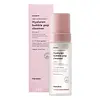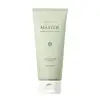What's inside
What's inside
 Key Ingredients
Key Ingredients

 Benefits
Benefits

 Concerns
Concerns

 Ingredients Side-by-side
Ingredients Side-by-side

Water
Skin ConditioningGlycerin
HumectantCoco-Betaine
CleansingDisodium Cocoamphodiacetate
CleansingSodium Chloride
MaskingPotassium Cocoyl Glycinate
Coco-Glucoside
CleansingCitric Acid
BufferingGlyceryl Caprylate
EmollientCaprylyl Glycol
EmollientSodium Cocoyl Isethionate
CleansingDisodium EDTA
Hexylene Glycol
Emulsifying1,2-Hexanediol
Skin ConditioningQuillaja Saponaria Bark Extract
CleansingMadecassoside
AntioxidantPropanediol
SolventBenzyl Glycol
SolventHydrolyzed Glycosaminoglycans
HumectantSodium Hyaluronate
HumectantSodium Hyaluronate Crosspolymer
HumectantHydrolyzed Hyaluronic Acid
HumectantEthylhexylglycerin
Skin ConditioningHydroxypropyltrimonium Hyaluronate
Hyaluronic Acid
HumectantSodium Acetylated Hyaluronate
HumectantWater, Glycerin, Coco-Betaine, Disodium Cocoamphodiacetate, Sodium Chloride, Potassium Cocoyl Glycinate, Coco-Glucoside, Citric Acid, Glyceryl Caprylate, Caprylyl Glycol, Sodium Cocoyl Isethionate, Disodium EDTA, Hexylene Glycol, 1,2-Hexanediol, Quillaja Saponaria Bark Extract, Madecassoside, Propanediol, Benzyl Glycol, Hydrolyzed Glycosaminoglycans, Sodium Hyaluronate, Sodium Hyaluronate Crosspolymer, Hydrolyzed Hyaluronic Acid, Ethylhexylglycerin, Hydroxypropyltrimonium Hyaluronate, Hyaluronic Acid, Sodium Acetylated Hyaluronate
Water
Skin ConditioningSodium Cocoyl Alaninate
Glycerin
HumectantDisodium Cocoamphodiacetate
CleansingAcrylates/C10-30 Alkyl Acrylate Crosspolymer
Emulsion StabilisingPotassium Cocoate
EmulsifyingCoco-Glucoside
CleansingDecyl Glucoside
CleansingCentella Asiatica Extract
CleansingHouttuynia Cordata Powder
Skin ConditioningMadecassoside
AntioxidantCeramide NP
Skin ConditioningPanthenol
Skin ConditioningGluconolactone
Skin ConditioningCapryloyl Salicylic Acid
ExfoliatingHyaluronic Acid
HumectantTheobroma Cacao Seed Extract
AntioxidantSodium Chloride
MaskingDisodium EDTA
Dextrin
AbsorbentHexylene Glycol
EmulsifyingPotassium Benzoate
PreservativeHydroxyacetophenone
AntioxidantWater, Sodium Cocoyl Alaninate, Glycerin, Disodium Cocoamphodiacetate, Acrylates/C10-30 Alkyl Acrylate Crosspolymer, Potassium Cocoate, Coco-Glucoside, Decyl Glucoside, Centella Asiatica Extract, Houttuynia Cordata Powder, Madecassoside, Ceramide NP, Panthenol, Gluconolactone, Capryloyl Salicylic Acid, Hyaluronic Acid, Theobroma Cacao Seed Extract, Sodium Chloride, Disodium EDTA, Dextrin, Hexylene Glycol, Potassium Benzoate, Hydroxyacetophenone
 Reviews
Reviews

Ingredients Explained
These ingredients are found in both products.
Ingredients higher up in an ingredient list are typically present in a larger amount.
Coco-Glucoside is a surfactant, or a cleansing ingredient. It is made from glucose and coconut oil.
Surfactants help gather dirt, oil, and other pollutants from your skin to be rinsed away.
This ingredient is considered gentle and non-comedogenic. However, it may still be irritating for some.
Learn more about Coco-GlucosideDisodium Cocoamphodiacetate is a surfactant and helps cleanse skin. It is created from the fatty acids of coconut oil.
Surfactants help rinse oil, dirt, and other pollutants easily from skin. It has a faint fruit-like scent.
Disodium EDTA plays a role in making products more stable by aiding other preservatives.
It is a chelating agent, meaning it neutralizes metal ions that may be found in a product.
Disodium EDTA is a salt of edetic acid and is found to be safe in cosmetic ingredients.
Learn more about Disodium EDTAGlycerin is already naturally found in your skin. It helps moisturize and protect your skin.
A study from 2016 found glycerin to be more effective as a humectant than AHAs and hyaluronic acid.
As a humectant, it helps the skin stay hydrated by pulling moisture to your skin. The low molecular weight of glycerin allows it to pull moisture into the deeper layers of your skin.
Hydrated skin improves your skin barrier; Your skin barrier helps protect against irritants and bacteria.
Glycerin has also been found to have antimicrobial and antiviral properties. Due to these properties, glycerin is often used in wound and burn treatments.
In cosmetics, glycerin is usually derived from plants such as soybean or palm. However, it can also be sourced from animals, such as tallow or animal fat.
This ingredient is organic, colorless, odorless, and non-toxic.
Glycerin is the name for this ingredient in American English. British English uses Glycerol/Glycerine.
Learn more about GlycerinHexylene Glycol is a surfactant. Glycols are a class of alcohols. Hexylene Glycol is a surfactant and emulsifier.
As a surfactant, Hexylene Glycol helps gather dirt and oil on your skin to be washed away.
As an emulsifier, Hexylene Glycol helps keep water and oil together. This prevents them from separating in a product. Hexylene Glycol also thins out the texture of a product by lessening viscosity.
Hexylene Glycol has a small molecular weight.
Learn more about Hexylene GlycolHyaluronic acid is naturally found in healthy skin. It is a humectant, meaning it draws moisture to your skin.
This ingredient helps hydrate, soothe, and protect the skin.
What makes hyaluronic acid so hydrating? It has the capacity to bind or hold large amounts of water.
Fun fact: It is already naturally found in our bodies, such as the fluids of our eyes and our joints.
Studies find this ingredient to have anti-inflammatory and anti-microbial properties. This can help speed up wound-healing.
Hyaluronic acid can be irritating if the molecule has a low-molecular weight, or if the molecules are small.
One study found low-molecular weight hyaluronic acid to be pro-inflammatory, meaning some people may experience irritation. This is because our bodies use hyaluronic acid in the wound-healing process to signal to our bodies, via irritation, that something needs healing.
The same study found high-molecular weight hyaluronic acid to be anti-inflammatory.
These are some other common types of Hyaluronic Acid:
Learn more about Hyaluronic AcidMadecassoside comes from the super popular skin-soothing ingredient, Centella asiatica. It is one of four active compounds found in the extract of Centella Asiatica.
Madecassoside has antioxidant, anti-inflammatory, and hydrating properties. It contains fatty acids, amino acids, beta-carotene, and phytochemicals.
One study found using Madecassoside with ascorbic acid helped reduce the signs of aging and improved skin hydration.
Learn more about MadecassosideChances are, you eat sodium chloride every day. Sodium Chloride is also known as table salt.
This ingredient has many purposes in skincare: thickener, emulsifier, and exfoliator.
You'll most likely find this ingredient in cleansers where it is used to create a gel-like texture. As an emulsifier, it also prevents ingredients from separating.
There is much debate on whether this ingredient is comedogenic. The short answer - comedogenic ratings don't tell the whole story. Learn more about comegodenic ratings here.
The concensus about this ingredient causing acne seems to be divided. Research is needed to understand if this ingredient does cause acne.
Scrubs may use salt as the primary exfoliating ingredient.
Learn more about Sodium ChlorideWater. It's the most common cosmetic ingredient of all. You'll usually see it at the top of ingredient lists, meaning that it makes up the largest part of the product.
So why is it so popular? Water most often acts as a solvent - this means that it helps dissolve other ingredients into the formulation.
You'll also recognize water as that liquid we all need to stay alive. If you see this, drink a glass of water. Stay hydrated!
Learn more about Water